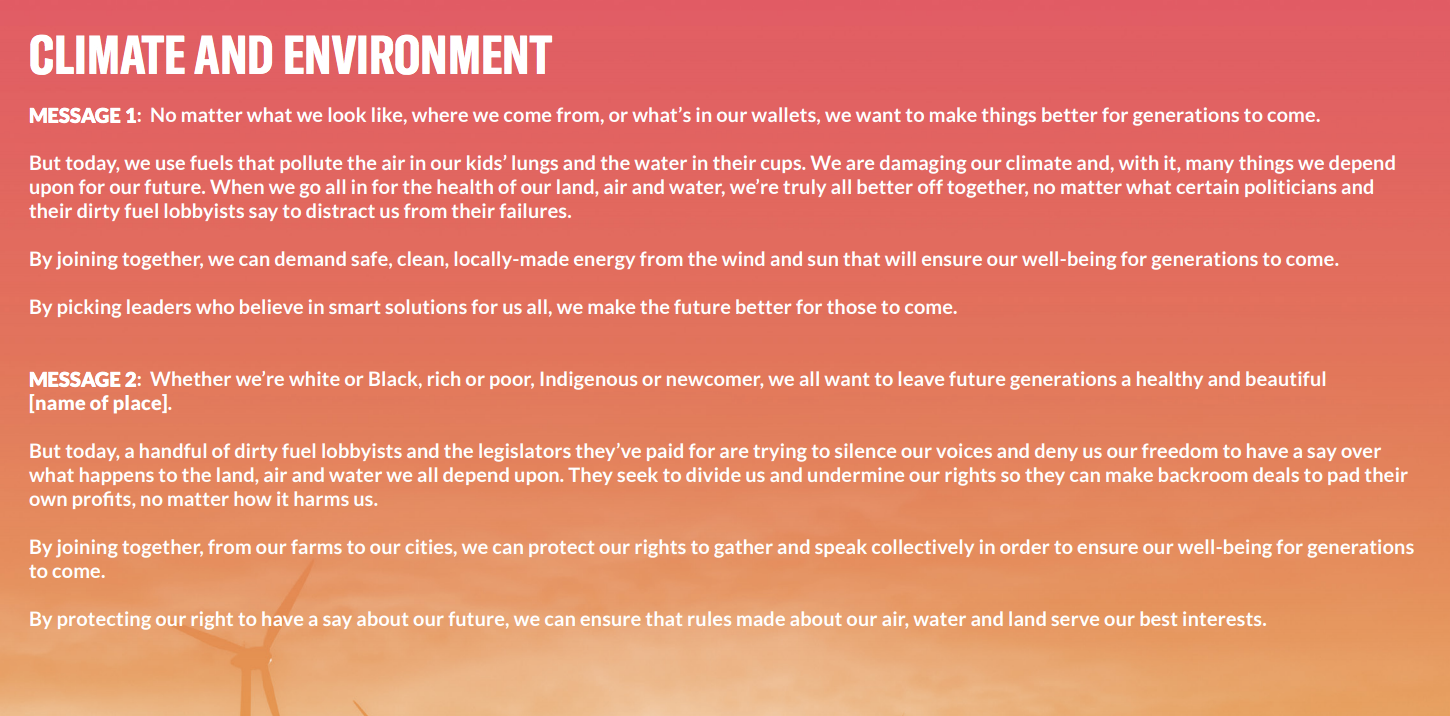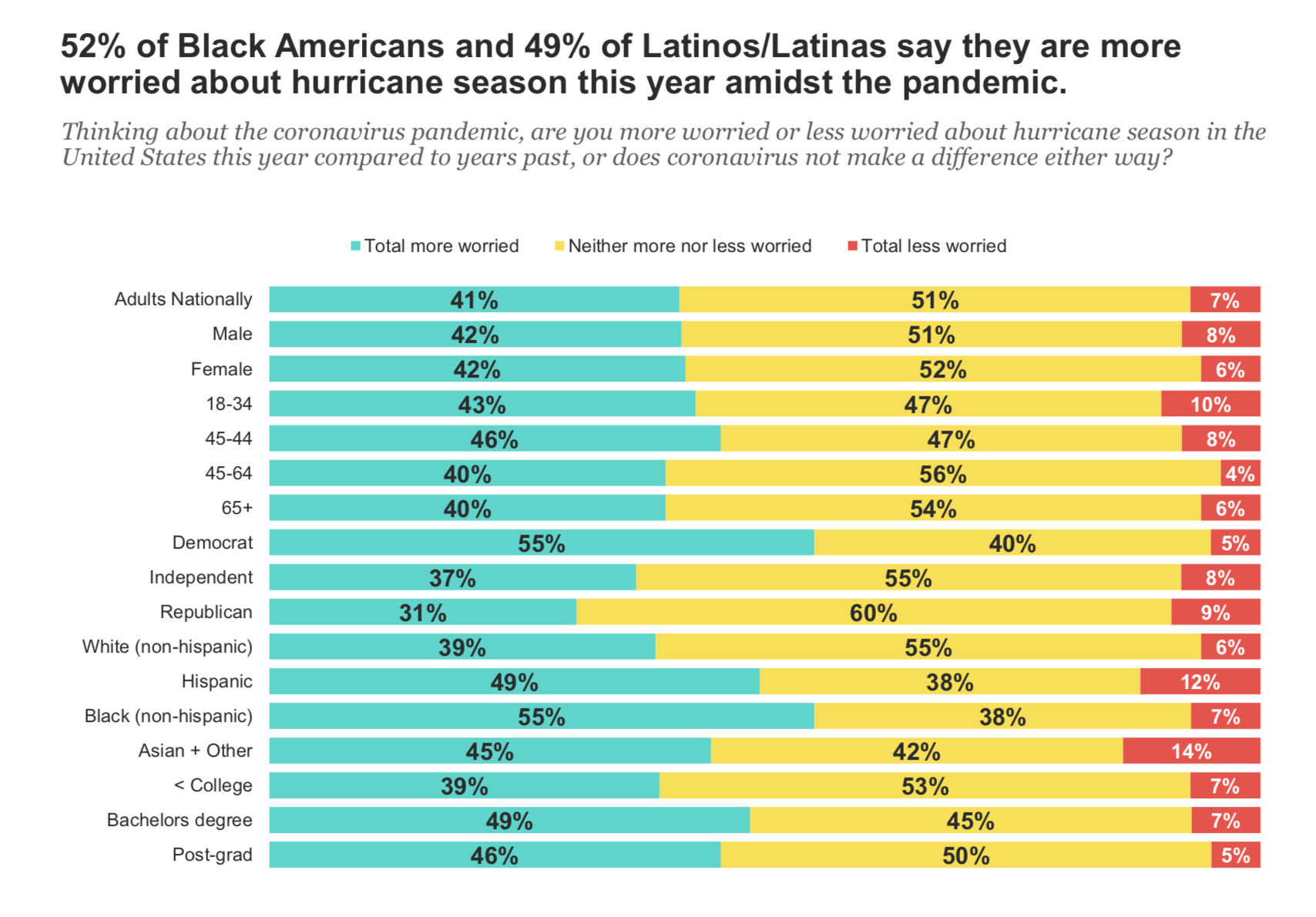Resources
Search below for resources covering the intersection of climate engagement, social science and data analytics.
RESULTS
Amid Brutal Natural Disaster Season, Nearly 3 in 4 Adults Say Climate Change Is Playing a Role
Nationally representative polling from Sept. 14-16 shows that 39% of US adults say that climate change has contributed “a lot” to recent natural disasters like hurricanes and wildfires, with a further 34% saying climate change was responsible for “some.” Black and Hispanic adults were the most likely to say “a lot” (49% each), with White respondents at 36%.
Other highlights:
- Roughly half (48 percent) of U.S. adults are “very concerned” about the impact of climate change on the U.S. environment.
- 4% of adults say they are considering moving now due to natural disaster concerns, and 16% say they would consider a move in the future.
- 39% if adults say they are “very concerned” about the impact of climate change on the U.S. economy.
- The percentage of adults who say they are “not concerned at all” about climate change fell to 8% in this survey.
We Make The Future Messaging Guide
The We Make the Future Messaging Guide is for campaigners, researchers, and all people who want to persuade others to take action to confront the challenges of a changing climate. The guide is based on rigorous research into perception and persuasion, and provide specific recommendations to engage base constituencies and persuade the middle (or people who haven't spent a lot of time thinking about specific solutions). The core of this work is the Race Class Narrative, an approach that weaves together economic empowerment, racial justice, climate justice, and gender equity, using language proven to work to mobilize and persuade people to take action.
This is a how-to guide. It provides guidance on:
- What to say and, crucially, what not to say
- How to weave together the rights words and the right narrative
- How to link related issues such as racial justice and climate justice within all your communications and calls-to-action
- Specific ways to use these messages on email, social media, and via text message
Poll: In time of COVID, two-thirds of Americans want climate action
Americans are worried about "triple threat" of hurricanes, COVID, & climate change. 52% of Black Americans and 49% of Latinos/Latinas say they are more worried about hurricane season this year amidst the pandemic. Half of adults in southeastern coastal states say they are more worried about hurricane season this year and 66% say addressing climate change should be a priority.
Webinar: Winning By A Landslide: How we won the Portland Clean Energy Fund (PCEF)
How did the alliance behind the Portland Clean Energy Fund (PCEF) move a visionary idea from concept to groundbreaking reality? In this webinar, the Climate Advocacy Lab was joined in conversation with members of the PCEF Steering Committee for an "under the hood" look at the campaign's insights, challenges, and lessons learned –– also captured in a new, interview-based report that captures the "anatomy" of the campaign. This campaign secured a landslide ballot measure victory in Portland in November 2018, establishing a multi-million dollar municipal fund that will address climate, economic, and racial justice by providing funding for renewable energy projects, job training and apprenticeship programs, and regenerative agriculture.
A Template for Change: The Portland Clean Energy Fund as a Local Model for a Green New Deal
This report details the anatomy of the campaign and strategy that achieved the groundbreaking Portland Clean Energy Fund (PCEF), a multi-million dollar fund that addresses climate, economic, and racial justice in Portland, OR.
Webinar: Our Power Puerto Rico: A campaign case study & framework for "Just Recovery"
As communities and advocates worldwide work to respond adequately to increasing climate disasters, where can climate advocates find resources to advance just, equitable, and community-based disaster recovery?
In this webinar, Climate Advocacy Lab teamed up with Climate Justice Alliance (CJA) to discuss CJA's recently released multimedia report Our Power Puerto Rico: Moving Toward a Just Recovery (a project completed with support from the Lab!). During the conversation, authors, experts, and frontline organizers who contributed to the case study and report highlight tools (including the 'Just Recovery framework'), practices, and experiential lessons learned from applying a participatory model of "Just Recovery" to disaster response in Puerto Rico following hurricane María.
Our Power Puerto Rico: Moving Toward a Just Recovery
This multimedia report provides a comprehensive case study of Climate Justice Alliance (CJA)’s Our Power Puerto Rico (OurPowerPR) campaign as a model of Just Recovery, an effective and innovative tool for climate adaptation that integrates many sectors of the economy to include energy democracy, food sovereignty, rural infrastructure and community self-determination.
Climate Change in the Latino Mind
Key findings from a nationally representative survey of 2,054 English and Spanish-speaking Latinos include: 84% of Latinos think global warming is happening and 70% understand it is mostly human caused. 78% are worried about global warming, with 35% "very worried". Latinos want corporations and industry (77%), citizens themselves (74%), President Trump (74%), and the U.S. Congress (73%) to do more to address global warming.
There’s one group of Americans that consistently cares about climate change
A good summary of all the polling and surveys showing that Latinos consistently show higher concern about climate change and support for climate action. It also explores some of the likely reasons for this support, including that a) Latinos have stronger ties to people in countries feeling more direct impacts of climate change, b) Latinos are on average younger than other demographic groups (and surveys show younger Americans in general are more supportive of climate action), and c) Latinos perceive themselves as more directly threatened by the impacts of climate change.
Poll: More Hispanics concerned with global warming
80% of Hispanics consider global warming to be a "somewhat serious" or "very serious" problem, up almost 7% from a year ago, according to a survey from the Florida Atlantic University Business and Economic Polling Initiative. More than half (54%) said they considered global warming a "deciding factor" in who they would vote for to be president.
Pagination
- Previous page
- Page 5
- Next page

